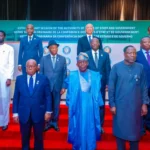Following months of lack of progress in the transition to civil rule programme agreed with the Malian junta headed by Colonel Assimi Goita, the Economic Community of West African States (ECOWAS) decided on Sunday, January 9, 2022 to tighten sanctions already in place against the military regime.
The latest slew of sanctions includes a total boycott of trade, road and air transportation as well as freezing of Malian financial assets.
- NIGERIA DAILY : The Role Religious Leaders Should Play In Nigerian Politics
- 2023: I’m capable but not desperate to lead Nigeria — Orji Kalu
The sanctions were a result of the refusal of the Colonel Goita-led military regime to agree to the one-year programme of transition to civil rule proposed by ECOWAS to end the lingering political impasse in the country since the overthrow of the civilian administration of Ibrahim Boubacar Keita.
Following the ouster of President Keita in 2020, ECOWAS agreed with the military junta that replaced him that an interim government be constituted to oversee an 18-month transition to civil rule programme. The interim government was duly set up with President Bah Ndaw and Prime Minister Moctar Ouene to handle this task.
But Colonel Goita and his military colleagues who retained real power behind the scenes decided to intervene once again a few months later blaming the interim government for reneging on some of the issues agreed.
Since then, the military junta has been involved in a testy stand-off with the ECOWAS and International community on the need to organise a transition to civil rule as quickly as possible.
Rather than agree to the ECOWAS proposal of a one-year programme, the junta instead proposed a five-year one which was rejected flat out and which led to the comprehensive sanctions now ranged against Mali.
The African Union, United Nations and the European Union which have all supported the ECOWAS action, are also considering further sanctions of their own.
With these developments, Mali faces further isolation and uncertainty which will not augur well for both the government and the citizens.
In this regard, it behoves the military regime of Colonel Goita to review its intransigent stance on the return to civil rule in Mali. Its proposal of a five-year programme is unconvincing to both Mali civil and political society and the outside world. Such a long-drawn process as proposed by the junta will not only lead to more political instability but also prolong the agony of the Malian people now groaning under harsh economic and social conditions from the current political impasse in the country.
It is also worthy to note that presently, large swathes of Mali is under the grip of rebel and insurgent groups trying to engage government forces in order to install their rule over those areas. The activities of Tuareg rebels fighting to carve out and install their own government and those of Islamist groups bent on establishing in Mali a forward operating base for their activities in the Sahelian region of West Africa is disconcerting enough.
The Colonel Goita-led junta should consider all these and not add to the agony of Malians by sticking to its position which is clearly untenable under the circumstances. That is why the junta’s bellicose reactions to the imposition of sanctions and condemnation of its actions by ECOWAS and the international community is unhelpful and risks further exacerbation of the already difficult situation in Mali. The junta ought to know that recalling its ambassadors in ECOWAS countries, instigating demonstrations against ECOWAS and issuing threats instead of dialogue and constructive engagement will neither help its position nor that of Mali.
We also call on ECOWAS and the international community to temper the need to pressure Mali with a consideration of the plight of the Malian people groaning under the double jeopardy of a military regime and the effects of punishing sanctions.
A group of 13 NGOs including the Norwegian Refugee Council (NRC) and the International Rescue Committee (IRC) have called on the international community to consider the humanitarian consequences in which about 7.5 million people constituting about a third of the population are without basic needs. “Malians are already bearing the brunt of the humanitarian catastrophe, punctuated by horrifying attacks against civilians. Sanctions must not hold us back from delivering essential assistance in a country where drought, rising insecurity and the economic impacts of COVID-19 are already pushing millions of Malians over the edge’,’ says Mali country Director of NRC, Elena Vicario.
We believe that under the circumstances, the situation in Mali calls for all parties involved to urgently review and reconsider their actions. The junta needs to tone down its rhetoric and instead seek a path of constructive dialogue with ECOWAS and the international community on the issues at stake. It is commendable that the junta despite itself has not totally closed down the channels of further discussions with ECOWAS.
ECOWAS and the international community also need to consider lessening the sanctions on Mali especially as regards access for humanitarian assistance to the most vulnerable sections of society. The current sanctions affect the Malian people more than those in government. In seeking to go ahead with it, ECOWAS would appear to be insensitive to the plight of ordinary Malians and thus risks losing both the moral and political reasons for embarking on them.

 Join Daily Trust WhatsApp Community For Quick Access To News and Happenings Around You.
Join Daily Trust WhatsApp Community For Quick Access To News and Happenings Around You.

